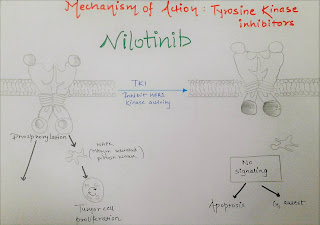Doxacurium
binds competitively to cholinergic
receptors on the motor end-plate to antagonize the action of acetylcholine,
resulting in a block of neuromuscular transmission (non-depolarizing). This
action is antagonized by acetylcholinesterase inhibitors, such as neostigmine. Doxacurium
is a long-acting, nondepolarizing
skeletal muscle relaxant. The neuromuscular block produced by doxacurium may be antagonized by anticholinesterase
agents. As with other nondepolarizing neuromuscular blocking agents, the more
profound the neuromuscular block at reversal, the longer the time and the
greater the dose of anticholinesterase required for recovery of neuromuscular
function. Doxacurium is approximately
2.5 to 3 times more potent than pancuronium and 10 to 12 times more potent than
metocurine.
REFERENCE-KD
TRIPATHI, JAYPEE BROTHERS MEDICAL PUBLISHERS PVT.LTD 7TH EDITION,
REPRINT 2001,PG NO.:347,352,353.
































